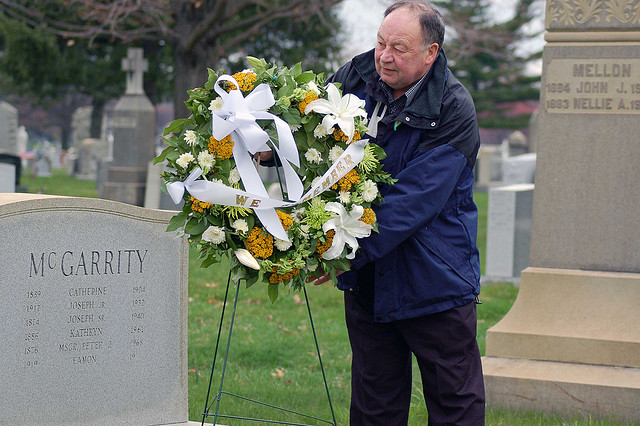Leading the Philadelphia St. Patrick’s Day Parade as grand marshal this March will be a man who understands the price of equality, justice, and freedom.
Paul Doris, a native of Coalisland, County Tyrone, in Northern Ireland, was a young man working in Portadown in 1972, when British troops in the mainly Catholic Bogside region of Derry shot 26 unarmed people protesting the British introduction of internment without trial in response to sectarian violence across the six counties. The day became known as “Bloody Sunday.”
Three days afterward, three men showed up at Doris’s door. One was armed. They ordered him to leave, telling him that Catholics would no longer have any work. Doris’s two younger brothers were subsequently imprisoned. One cousin was shot and killed and another wounded in two separate incidents.
A skilled and dedicated Gaelic footballer—and at the time unemployed and worried about his family’s safety–Doris jumped at the offer from the Kevin Barry’s Gaelic Football Club in Philadelphia to come to the city to play for the summer, something many Irish footballers have been doing for decades. He wound up staying, working in landscaping and construction for a few years before joining the Teamsters Local 115.
He signed up for the Philadelphia Tyrone Society as well Irish Northern Aid, an American organization that supports a united Ireland, the promise of the Good Friday Agreement which brought peace—though an uneasy one—to Northern Ireland. He got involved in fundraising and protesting. In 1976, he took part in the march from Baltimore to Washington, DC, to raise awareness of the British internment policies.
In 1980, to show his solidarity with the first hunger strikers in Long Kesh prison came, he and three others went on a very public hunger strike at 5th and Chestnut, not far from Independence Hall, which end when word reached them that the prisoners had reached an agreement with the Margaret Thatcher government on their demands, one of which was that they be treated as political prisoners. That meant they wouldn’t wear prison uniforms or do prison work. The government later reneged which led to the second hunger strike in 1981, which led to the deaths of Bobby Sands and nine other prisoners.
Doris was named national president of Irish Northern Aid in 1996, a post he holds today. He has become a close confidante of Sinn Fein leader Gerry Adams and frequently arranges visits of speakers to update Irish supporters and political leaders on the ongoing peace process in Northern Ireland. He is actively involved in the local organization planning for the centenary of the 1916 Easter Rising in April. Though the Rising, an armed insurrection by a group of Irish nationalists, failed and many of its leaders were executed, it was a major step toward Irish independence, which came at the end of another armed conflict in 1921.
He didn’t forget football. Doris was a founding member of the Shamrocks Football Club and helped found the Notre Dames Ladies Gaelic Football Club, national champs, whom he coached for many years. He’s been chairman twice of the Gaelic Athletic Association and served as a football referee, including at the North American Football Finals.
Doris is married to Rosemary McTeague; they have two children, Deirdre, a nurse, and Brendan, a Philadelphia police officer. Brendan’s wife, Cherie, is also a Philly cop. They also have five grandchildren.
The 2016 Philadelphia St. Patrick’s Day Parade takes place on Sunday, March 13.

